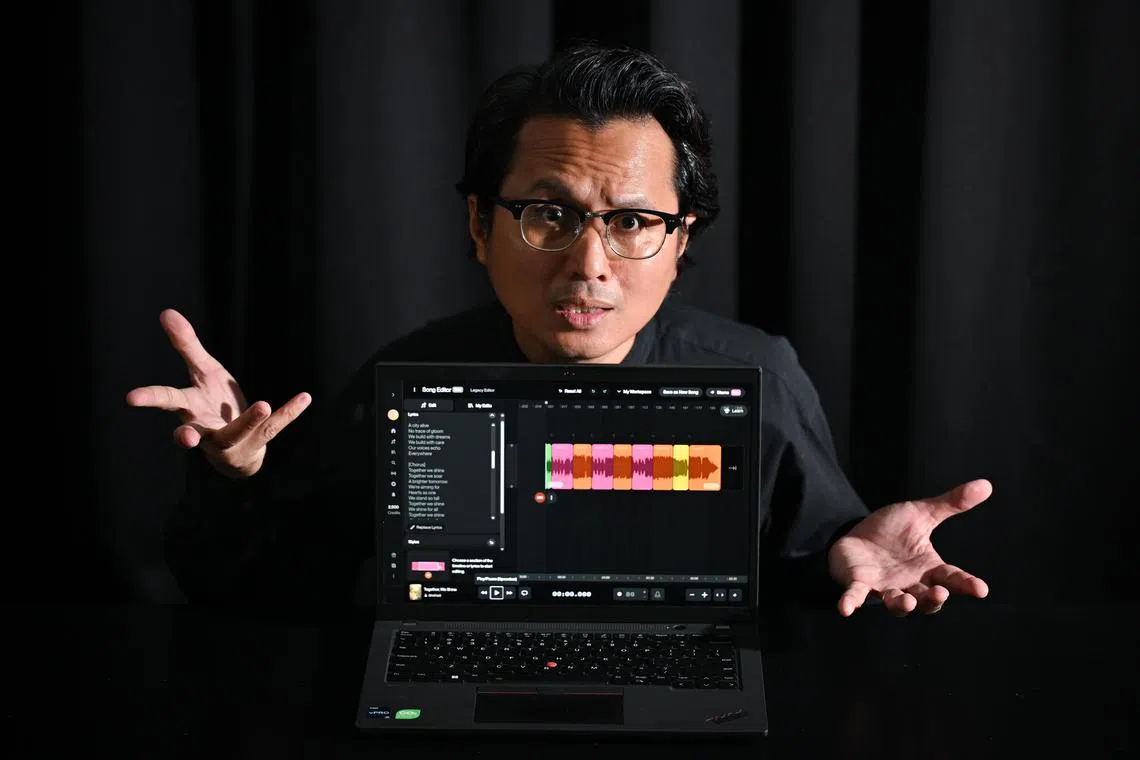Viewpoint: What happens when you use AI to make a National Day song?
Sign up now: Get ST's newsletters delivered to your inbox

ST music correspondent Eddino Abdul Hadi tried to come up with a National Day song using generative AI. The result was lifeless and dull.
ST PHOTO: LIM YAOHUI
SINGAPORE – As someone who has been playing the guitar for many years and has had experience writing, recording and releasing music before the advent of artificial intelligence (AI), I have mixed feelings about using the technology to come up with songs.
I understand it can be a tool to discover new sonic possibilities, but I am also wary of its potential to devalue, and even replace, human labour.
So, when the assignment from my editors – to come up with a National Day song using AI – fell into my lap, I approached it with both curiosity and dread.
After reading up on the various platforms that allow users, regardless of music experience or expertise, to come up with music using generative AI, I decided on Suno. Based on reviews and feedback, it seems to be among the more intuitive ones that let users come up with songs quickly.
A few minutes later, a complete song with lyrics, a human-like singing voice and instrumentation such as drums, guitars, strings and synthesizers was born.
All I had to do was type in a few text prompts – which in this case was essentially something based on recent National Day Parade (NDP) anthems such as Not Alone (2024) and Shine Your Light (2023).
But I cannot take credit for, or feel any sense of ownership over, this tune, no more than I can call myself a chef after I microwave a frozen meal bought from 7-11.
Titled Together, We Shine, it might pass as background or elevator music, but is way too generic and bland for anyone to ever take seriously as an anthem fit for the nation’s 60th birthday.
The lyrics are cliched, rife with monosyllabic rhymes (“way” with “grey”, “tall” with “all”) and cobbled together using previous official NDP favourites (“We build with dreams, we build with care, our voices echo everywhere”).
The male singing voice has, for some reason, a vague American accent, and the audio sounds so compressed and over-polished that it comes across lifeless and flat.
You can listen to it here ( str.sg/aBzo
AI-made music has been in the news lately, mostly thanks to the whirlwind Spotify success of AI-generated indie rock band The Velvet Sundown
The concerning thing is, for the first month of its existence, the “band” insisted they were real humans, despite many speculating they were an AI creation. While photos of the four members were clearly produced with gen-AI, The Velvet Sundown – whose music and image borrow heavily from retro 1970s rock – had a pretty convincing backstory on their profile.
Their music was also automatically pushed to users’ playlists by Spotify’s algorithm – one of the reasons they got so big so quickly, while human music-makers struggle to get streams. It was only about a month after the quartet’s June debut that they were revealed to be an “art hoax”.
But, like with most other tech, AI is just a tool, and not inherently bad. While platforms like Suno and Udio offer idiot-proof ways to generate immediate songs – the way I did with mine – there are many other ways that AI is being used to enhance human creativity in music.
For example, Singapore-based online music-making platform BandLab has AI features designed to help and supplement human creativity, instead of replacing it.
In an online workshop with the company’s head of artist development and education Kevin Breuner, a musician and songwriter himself, I learnt how users can use its AI tools to help suggest ideas, enhance audio recordings and convert a human voice into an instrument.
The bulk of the work in song creation ultimately falls on the artiste using the platform, so there is still a lot of emphasis on human ingenuity.
Right now, there are a few tell-tale signs that a piece of music is written by software. In the case of The Velvet Sundown, the lead singer’s voice inexplicably changes from song to song.
But at the rate the technology is advancing, it will not be long before AI-generated music will sound so authentic that even the most seasoned music experts will not be able to tell it is artificial.
And that is when music lovers, or anyone who consumes music in any form, has to decide if they value human artistry and inventiveness enough to always choose a work crafted by a real person over one churned out via binary code.



